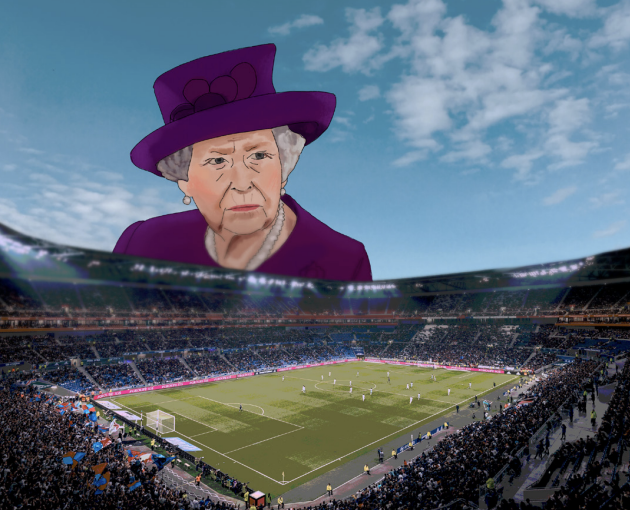Thursday, April 24
God Save the Queen...and the Football! The Separation of Sport & State
Stanley Dufour '25 in Sports | September 23, 2022

September 8, 2022 marked the end of an era for the United Kingdom, as the 70-year reign of Queen Elizabeth II drew to a close. Queen Elizabeth’s death sparked a period of national mourning, as thousands gathered across various English cities to pay their respects. In light of the mourning, sporting events across the nation were postponed or cancelled out of respect, most notably the Premier League, a British soccer league with an annual audience of around 4.7 billion—one of the most popular sports leagues worldwide. Officials of the Premier League said in a statement, “To honour [Queen Elizabeth’s] extraordinary life and contribution to the nation, and as a mark of respect, this weekend's Premier League match round will be postponed, including Monday evening's game.” The news was received with mixed reactions, with many fans claiming that the league was choosing its public image over player welfare. As it is a World Cup year, the Premier League’s schedule is already packed. Postponing these games, on top of delaying the Premier League's tight schedule, also meant wasted travel plans and lost pay time for countless workers in a country already facing a cost-of-living crisis. Furthermore, some have argued that postponing a sporting event such as the Premier League might ironically diminish mourning for the Queen. As Sports Illustrated writer Jonathan Wilson noted, ‘a sports stadium is probably the best place to experience one of those rare moments of national unity’.
This controversy is one of many surrounding the major and long-standing question: To what extent should matters of state, and politics at large, affect sports? From debates concerning the “bathroom bill,” equal women’s pay, and the ‘Black Lives Matter’ movement in the 2020 NBA season, to Colin Kaepernick’s famous refusal to stand for the national anthem in 2016, politics have always been a part of sports, and it will continue to be in some shape or form. So how much overlap is too much?
On one hand, it could be argued that politics should, in fact, be a big part of sports. If you ask most people about athletes like Christiano Ronaldo, LeBron James, or Tom Brady, chances are they’ll at least have heard of them. In today's world, sports stars are worshippedand given a status that most people can only dream of attaining. With this level of influence, many argue that athletes have a social responsibility to use their voice to advocate for global issues. Many incredible athletes such asMuhammad Ali are remembered not only for their athletic achievements, but also for their influence off the playing field. Another argument in favour of political involvement in sports is on a more international scale, when different countries compete against each other. In the Olympic Games, for example, people don’t really look at individual athletes and their backgrounds—they look at the country they represent. A sports team representing a country also represents its values, which makes it difficult not to involve politics. Many of Russia’s athletes are currently banned from competing in the 2024 Olympics due to the nation’s ongoing invasion of Ukraine, and to most, this type of consequence seems fair because the Olympic Games aren’t just a sporting event. When a Russian athlete raises the gold medal for their nation, millions watching the event won’t be thinking of the sport or the athlete's individual skill; rather, they see the praising and honouring of a country that needlessly killed tens of thousands of innocent civilians just a few years back.
On the flip side of the coin, many would say that the worlds of sports and politics shouldn’t collide. Sports are supposed to be “pure”—they are supposed to bring people of all backgrounds together to appreciate the skill of an athlete and the excitement of a game. Sports are supposed to be an escape from reality, a period of time where the only thing in the world that matters is the ball and the score. It’s supposed to be a time when people put their differences aside and unite to laugh or cry or cheer or rage over a team hundreds of miles away. Sports is about which athlete has more heart, more grit, or more skill, not which political stance they take.
At the end of the day, it’s impossible for sports to completely detach itself from its social roots, and some overlap can certainly do good for the world, so long as the overlap doesn't detract from the essence of the sport.
Related Articles
- The Case For Farming: The Big Red Farm is not a gimmick—it’s a way of life Eric Chen ’27
- A Season of Madness Derek Wolfe ’27
- Fly Eagles Fly Ellie Duffy ’26
- The 2025 Australian Open Marcus Tsai ’27
- Saquon Barkely & the Power of a Trade Ellie Duffy ’26
Recent Articles
- Announcing: Valedictorian, Aurelian Speakers, and Faculty Speaker Sophie Liu ’27
- Senior Profile: Sophie Cheng ’25 Katherine Qiu ’27
- Debunking the Dining Hall Debate: Is Lawrenceville’s Dining Really That Bad? Isabelle Lee ’27
- Welcoming Our New VPs for 2025-2026 Sophie Liu ’27
- A Sweet Return: Melba Reopens with New Flavors and Community Spirit Ella Song ’27